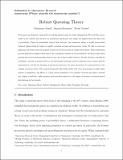Robust Queueing Theory
Author(s)
Bandi, Chaithanya; Bertsimas, Dimitris J; Youssef, Nataly
DownloadRobust Queueing Theory.pdf (598.4Kb)
OPEN_ACCESS_POLICY
Open Access Policy
Creative Commons Attribution-Noncommercial-Share Alike
Terms of use
Metadata
Show full item recordAbstract
We propose an alternative approach for studying queues based on robust optimization. We model the uncertainty in the arrivals and services via polyhedral uncertainty sets, which are inspired from the limit laws of probability. Using the generalized central limit theorem, this framework allows us to model heavy-tailed behavior characterized by bursts of rapidly occurring arrivals and long service times. We take a worst-case approach and obtain closed-form upper bounds on the system time in a multi-server queue. These expressions provide qualitative insights that mirror the conclusions obtained in the probabilistic setting for light-tailed arrivals and services and generalize them to the case of heavy-tailed behavior. We also develop a calculus for analyzing a network of queues based on the following key principles: (a) the departure from a queue, (b) the superposition, and (c) the thinning of arrival processes have the same uncertainty set representation as the original arrival processes. The proposed approach (a) yields results with error percentages in single digits relative to simulation, and (b) is to a large extent insensitive to the number of servers per queue, network size, degree of feedback, and traffic intensity; it is somewhat sensitive to the degree of diversity of external arrival distributions in the network.
Date issued
2015-06Department
Sloan School of ManagementJournal
Operations Research
Publisher
Institute for Operations Research and the Management Sciences (INFORMS)
Citation
Bandi, Chaithanya, Dimitris Bertsimas, and Nataly Youssef. “Robust Queueing Theory.” Operations Research 63, no. 3 (June 2015): 676–700.
Version: Original manuscript
ISSN
0030-364X
1526-5463